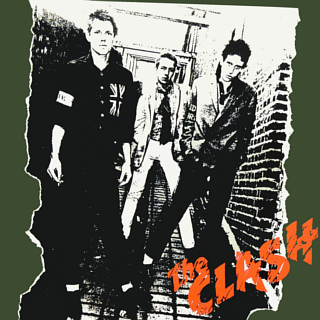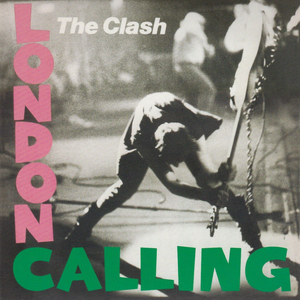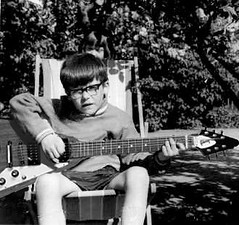Thursday, September 04, 2008
CLASH CITY ROCKERS
I came late to the Clash party. I remember my brother Rod having the first two records, 'The Clash' (1977-UK, 1979-US), and 'Give 'em Enough Rope' (1978), but the first time I recall hearing the Clash was in Alex Mans' Road Crew Mobile Unit One in 1983. He had the first record in the cassette player and I remember hearing 'Hate and War'. I suppose I though it was okay, but not my cup o' beverage, at least not yet.
In the early 90's I made a mix tape at Rod's house that had selections from 'London Calling' (1979): 'London Calling', 'Brand New Cadillac', 'Jimmy Jazz', 'Lost In the Supermarket', and 'Clampdown', so I guess by then I'd come to appreciate the Clash.
Soon after I bought the first record on cassette, and by '97 I had become a full blown Clash fan, and had obtained all their albums on vinyl, with the exception of 'Cut the Crap' (1985), which I don't consider to be an actual Clash record due to the lack of Mick Jones.
What finally sold me on the Clash wasn't so much their seminal Punk sound, or the sociopolitical content of their songs. What sold me was the fact that they were a great Rock band. Joe Strummer's post Clash career serves only to point out that the Clash was indeed an example of the sum being greater than the parts. Mick brought hooks and melody, Paul Simonon brought credibility, and Topper Headon brought talent.
What I like the most about the Clash is the diversity of musical styles. By their third album ('London Calling'), they had moved beyond the limits of traditional Punk, expanding on the Reggae influence, and delving into a number of other musical frontiers.
Chrispy asked me recently where the Reggae came from. Certainly the Clash were not the only English Punk band to dabble with the 'crooked beat', they just did it better, or more authentically. The Reggae influence was two fold. Paul Simonon (bass) grew up in Brixton surrounded by Jamaican immigrants, Reggae was the soundtrack to his youth. The major factor, however, and this goes for the entire English Punk community, was Don Letts. Don was the house DJ at the Roxy, the first, and initially the only club in London that would put up with Punks. Don spun mostly Reggae, and thus the English Punk scene was born amid the sound of Roots Reggae, Dub, and Ska.
The Clash, in particular, were fascinated with Jamaican music. Their initial attempt at Reggae can be found on their debut record in the form of their cover of Junior Marvin and Lee Perry's 'Police and Thieves'. While a bit faster and more angular than the real thing, it was a notable and reverent effort.
The Clash's obsession with Reggae went beyond music as well. In aligning themselves with Reggae, they were consciously associating themselves with Rastas and Rude Boys - outcasts, criminals, and most importantly, political outsiders. The Clash, very early on, was as much a political organization as it was a band. Frantically trying to shed, or at least obscure the middle class roots of three quarters of the band (Paul was decidedly working class, hence the credibility previously mentioned), Reggae was a perfect touchstone for their personal historical revisionism. 'White Man In Hammersmith Palais', also from the debut record, though not Reggae, lyrically sums up the relationship between the band and Reggae.
"Midnight to six man, for the first time from Jamaica
Dillinger and Leroy Smart, Delroy Wilson, your cool operator
Ken Boothe for UK pop reggae, with backing bands sound systems
And if they've got anything to say, there's many black ears here to listen
But it was Four Tops all night with encores from stage right
Charging from the bass knives to the treble
But onstage they ain't got no roots rock rebel
Onstage they ain't got no...roots rock rebel
White youth, black youth, better find another solution
Why not phone up Robin Hood, and ask him for some wealth distribution
Punk rockers in the UK, they won't notice anyway
They're all too busy fighting, for a good place under the lighting
The new groups are not concerned, with what there is to be learned
They got Burton suits, ha you think it's funny, turning rebellion into money
All over people changing their votes, along with their overcoats
If Adolf Hitler flew in today, they'd send a limousine anyway
I'm the all night drug-prowling wolf, who looks so sick in the sun
I'm the white man in the Palais just lookin' for fun
I'm only looking for fun"
So wholly taken by Jamaican culture, the Clash decided to take a Jamaican holiday in early 1978 just prior to recording their second album. Their dreams of harmoniously integrating with the Kingston scene were dashed upon the rock of racial reality. Where they weren't shunned they were robbed and threatened. Jamaica was not Brixton. They high tailed it home after a few days. 'Safe European Home' from 'Give 'em Enough Rope' details the experience.
"Well, I just got back an' I wish I never left now
Who dat martian arrivin' at the airport?
How many local dollars for a local anaesthetic?
The johnny on the corner wasn't very sympathetic
I went to the place where every white face is an invitation to robbery
An' sitting here in my safe European home, I don't wanna go back there again"
But the love for the music remained.
'Give 'em Enough Rope' shows the band branching out in other ways as well. 'Julie's Been Working For the Drug Squad' offers a Swing feel, and 'Stay Free', Mick's touching ode to childhood friends gone astray, displays Mick's emerging strength as a Pop songsmith.
The Clash followed 'London Calling' with a compilation of B-Sides and out-takes, and again 'Black Market Clash' dishes up the Jamaican influence. Side one is all Punk Rock and Rock, even a cover of Toots Hibbert's (Toots and the Maytals) 'Pressure Drop' features a speedy Rock arrangement to a Reggae classic. Side two is all Dub. On 'Bankrobber', and 'Armagideon Time' the Clash completely nail the freaky echo laden Reggae sub genre.
The success of 'Combat Rock' propelled the Clash into the stratosphere of Rock stardom, which, predictably, killed the band.
I don't know if they were 'the only band that mattered', but they did leave a legacy, an indelible stamp on modern music, and that matters, it matters quite a bit.

I came late to the Clash party. I remember my brother Rod having the first two records, 'The Clash' (1977-UK, 1979-US), and 'Give 'em Enough Rope' (1978), but the first time I recall hearing the Clash was in Alex Mans' Road Crew Mobile Unit One in 1983. He had the first record in the cassette player and I remember hearing 'Hate and War'. I suppose I though it was okay, but not my cup o' beverage, at least not yet.
In the early 90's I made a mix tape at Rod's house that had selections from 'London Calling' (1979): 'London Calling', 'Brand New Cadillac', 'Jimmy Jazz', 'Lost In the Supermarket', and 'Clampdown', so I guess by then I'd come to appreciate the Clash.

Soon after I bought the first record on cassette, and by '97 I had become a full blown Clash fan, and had obtained all their albums on vinyl, with the exception of 'Cut the Crap' (1985), which I don't consider to be an actual Clash record due to the lack of Mick Jones.
What finally sold me on the Clash wasn't so much their seminal Punk sound, or the sociopolitical content of their songs. What sold me was the fact that they were a great Rock band. Joe Strummer's post Clash career serves only to point out that the Clash was indeed an example of the sum being greater than the parts. Mick brought hooks and melody, Paul Simonon brought credibility, and Topper Headon brought talent.
What I like the most about the Clash is the diversity of musical styles. By their third album ('London Calling'), they had moved beyond the limits of traditional Punk, expanding on the Reggae influence, and delving into a number of other musical frontiers.
Chrispy asked me recently where the Reggae came from. Certainly the Clash were not the only English Punk band to dabble with the 'crooked beat', they just did it better, or more authentically. The Reggae influence was two fold. Paul Simonon (bass) grew up in Brixton surrounded by Jamaican immigrants, Reggae was the soundtrack to his youth. The major factor, however, and this goes for the entire English Punk community, was Don Letts. Don was the house DJ at the Roxy, the first, and initially the only club in London that would put up with Punks. Don spun mostly Reggae, and thus the English Punk scene was born amid the sound of Roots Reggae, Dub, and Ska.
The Clash, in particular, were fascinated with Jamaican music. Their initial attempt at Reggae can be found on their debut record in the form of their cover of Junior Marvin and Lee Perry's 'Police and Thieves'. While a bit faster and more angular than the real thing, it was a notable and reverent effort.
The Clash's obsession with Reggae went beyond music as well. In aligning themselves with Reggae, they were consciously associating themselves with Rastas and Rude Boys - outcasts, criminals, and most importantly, political outsiders. The Clash, very early on, was as much a political organization as it was a band. Frantically trying to shed, or at least obscure the middle class roots of three quarters of the band (Paul was decidedly working class, hence the credibility previously mentioned), Reggae was a perfect touchstone for their personal historical revisionism. 'White Man In Hammersmith Palais', also from the debut record, though not Reggae, lyrically sums up the relationship between the band and Reggae.
"Midnight to six man, for the first time from Jamaica
Dillinger and Leroy Smart, Delroy Wilson, your cool operator
Ken Boothe for UK pop reggae, with backing bands sound systems
And if they've got anything to say, there's many black ears here to listen
But it was Four Tops all night with encores from stage right
Charging from the bass knives to the treble
But onstage they ain't got no roots rock rebel
Onstage they ain't got no...roots rock rebel
White youth, black youth, better find another solution
Why not phone up Robin Hood, and ask him for some wealth distribution
Punk rockers in the UK, they won't notice anyway
They're all too busy fighting, for a good place under the lighting
The new groups are not concerned, with what there is to be learned
They got Burton suits, ha you think it's funny, turning rebellion into money
All over people changing their votes, along with their overcoats
If Adolf Hitler flew in today, they'd send a limousine anyway
I'm the all night drug-prowling wolf, who looks so sick in the sun
I'm the white man in the Palais just lookin' for fun
I'm only looking for fun"
So wholly taken by Jamaican culture, the Clash decided to take a Jamaican holiday in early 1978 just prior to recording their second album. Their dreams of harmoniously integrating with the Kingston scene were dashed upon the rock of racial reality. Where they weren't shunned they were robbed and threatened. Jamaica was not Brixton. They high tailed it home after a few days. 'Safe European Home' from 'Give 'em Enough Rope' details the experience.

"Well, I just got back an' I wish I never left now
Who dat martian arrivin' at the airport?
How many local dollars for a local anaesthetic?
The johnny on the corner wasn't very sympathetic
I went to the place where every white face is an invitation to robbery
An' sitting here in my safe European home, I don't wanna go back there again"
But the love for the music remained.
'Give 'em Enough Rope' shows the band branching out in other ways as well. 'Julie's Been Working For the Drug Squad' offers a Swing feel, and 'Stay Free', Mick's touching ode to childhood friends gone astray, displays Mick's emerging strength as a Pop songsmith.


The Clash followed 'London Calling' with a compilation of B-Sides and out-takes, and again 'Black Market Clash' dishes up the Jamaican influence. Side one is all Punk Rock and Rock, even a cover of Toots Hibbert's (Toots and the Maytals) 'Pressure Drop' features a speedy Rock arrangement to a Reggae classic. Side two is all Dub. On 'Bankrobber', and 'Armagideon Time' the Clash completely nail the freaky echo laden Reggae sub genre.


1982's 'Combat Rock' was a decidedly reigned in response to the excess of 'Sandinista'. While providing the Clash with two massive hits, 'Rock the Casbah' and 'Should I Stay or Should I Go', it hasn't much else to commend it outside of 'Straight to Hell', which combines Caribbean and Asian motifs, and 'Ghetto Defendant', which features a spoken word performance by Allen Ginsberg.
The success of 'Combat Rock' propelled the Clash into the stratosphere of Rock stardom, which, predictably, killed the band.
I don't know if they were 'the only band that mattered', but they did leave a legacy, an indelible stamp on modern music, and that matters, it matters quite a bit.
Comments:
Another killer Jackson post...
Have not given up on embracing the Clash with a bigger hug, but still struggle a bit with their records. Just can't quite get drawn in completely to their records.
One cool thing though is that when I hear thier signature sound it immediately takes me back to my summer in the UK. That reggae/ska thing is uniquely London in my book.
Have not given up on embracing the Clash with a bigger hug, but still struggle a bit with their records. Just can't quite get drawn in completely to their records.
One cool thing though is that when I hear thier signature sound it immediately takes me back to my summer in the UK. That reggae/ska thing is uniquely London in my book.
great post
for me the thing about the clash is i never tire of them. if i don't know what to put on, i can always put on the clash and be happy
Post a Comment
for me the thing about the clash is i never tire of them. if i don't know what to put on, i can always put on the clash and be happy

